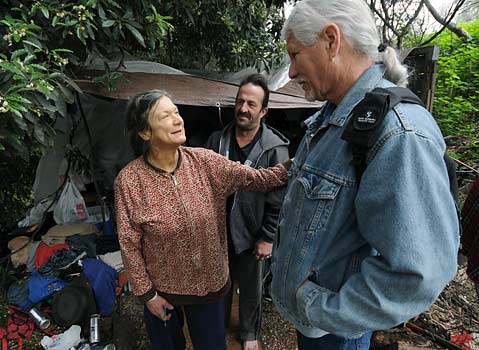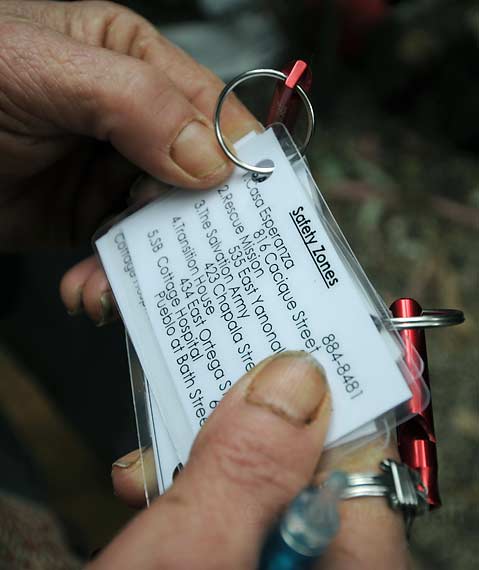Homeless Women Rape Prevention
Whistles and Emergency Contact Cards Dispensed

To educate homeless women about rape and violence prevention, social worker and homeless advocate Ken Williams hosted a workshop on Thursday, March 18 in Casa Esperanza Homeless Shelter’s parking lot.
Attended by around 30 women, the clinic provided an opportunity for Williams, as well as Casa Esperanza and Cottage Hospital counselors, to dispense laminated information cards with the locations and phone numbers of “safety zones” including, among others, the Rescue Mission and Transition House. Each card had a list of emergency numbers and came with a rape whistle attached.
Williams also offered information sheets spelling out practical safety measures homeless women are advised to follow for the sake of their personal protection. Titled the “Santa Barbara Safety Net,” the sheet recommends homeless women stay in lit places, camp with people they know and trust, avoid isolated places, etc. Beyond the sensible words of advice, Williams noted, the cards have become a catalyst for the women to openly speak about past assaults, confiding in him and each other.

It’s Williams’s hope that the messages will not only be taken to heart by the women who attended Thursday’s workshop, but that those who attended will also spread the word to others in Santa Barbara’s homeless community.
Perhaps most importantly, Williams has facilitated an agreement with area shelters and the homeless community stating that, in an instance of crisis, no woman will be turned away despite possible past issues. “It’s encouraging for them that, no matter what, a shelter will take them in even if their behavioral issues have been a problem in the past.”
Williams revealed that this past winter, there were two confirmed rapes of homeless women, with three other sexual assaults rumored, and he fears there are many incidents that simply go unreported. “They’re extremely vulnerable,” said Williams. “Because they live outside, and can’t just go inside and lock their doors, they worry a lot about retaliation. Hopefully [this effort] will help them overcome that sense of isolation and fear.”
Estimating that 100 to 200 homeless women live in the area at any given time, Williams hopes the small but significant prevention strategy will avoid future incidents. “If everyone knows that these cards are out there,” stated Williams, “it might scare someone from [committing rape]. Those guys are cowards anyway.” He’s also stressing to the women that if something does happen to one of them, they should immediately contact the police and seek assistance.
With the help of Casa Esperanza, Williams has created 1,000 of the laminated cards, up from the 400 he made last year. A number have been given to the Police Department and Cottage Hospital, said Williams, and he plans to hand out hundreds more to individual women in the coming weeks. Some of the immediate reactions he’s received from women are of cynicism but, he stated, the skepticism that the cards and whistles will actually make a difference is slowly being replaced by graciousness. “They’re just thankful knowing that someone and something is out there to help them,” Williams said.



